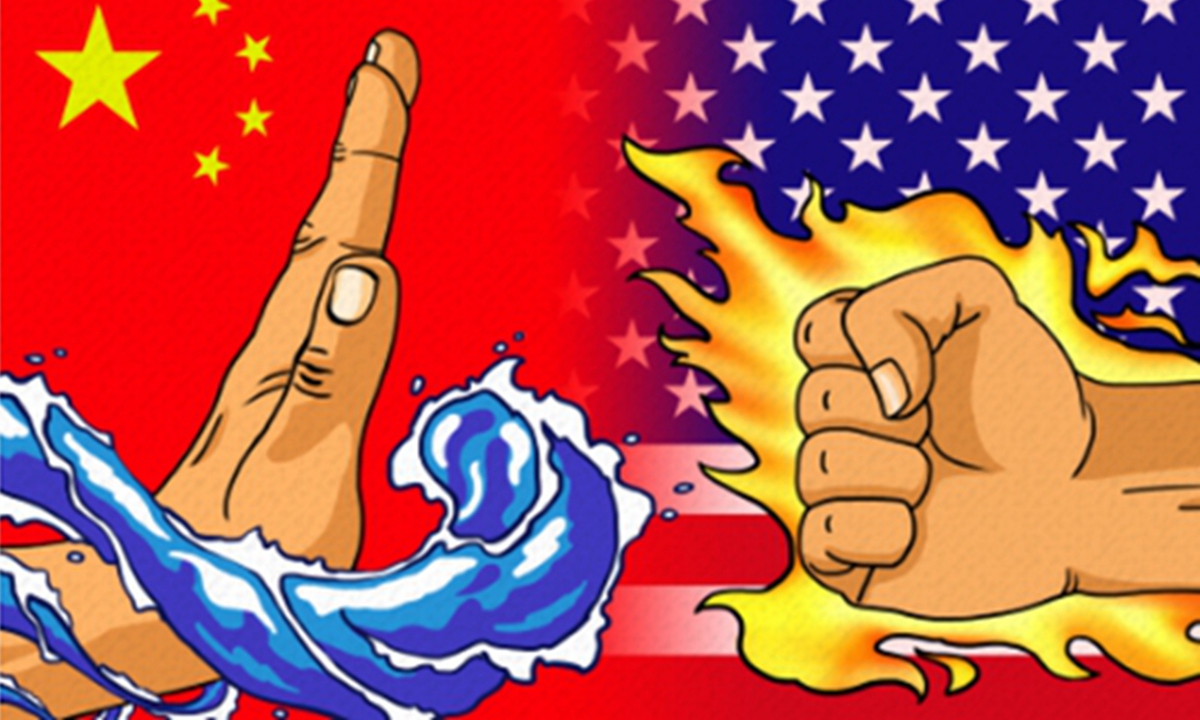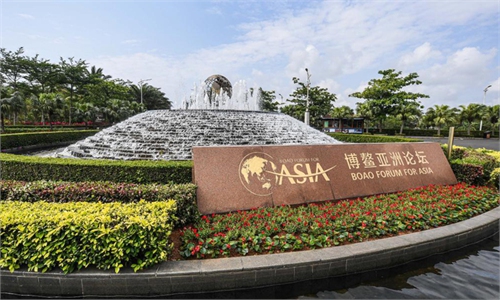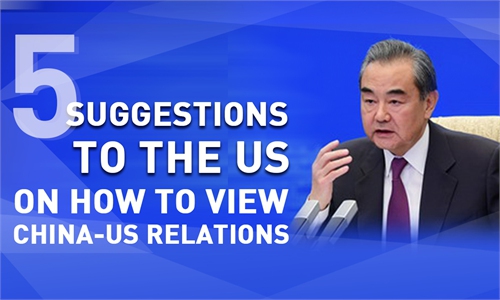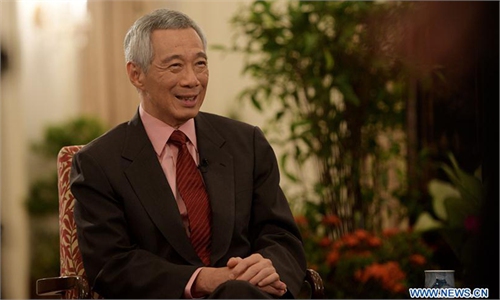
Illustration: Liu Rui/GT
Editor's Note:As a bipartisan "anti-China" consensus seems to become increasingly solid in the US and the US' foreign policy is showing more recklessness, how will the US' China policy develop in the future? How can the impasse of China-US relations be broken and move the ties forward? Global Times (GT) reporter Li Qingqing talked to Michael D. Swaine (Swaine), director of the US think tank Quincy Institute's East Asia program, on these issues in an exclusive email interview.
GT: The Quincy Institute (QI) promotes ideas that move US foreign policy away from endless wars and toward vigorous diplomacy in the pursuit of international peace. Can you elaborate how QI will help bring US foreign policy back to the right track?
Swaine: QI was largely created in response to the endless, destructive wars that resulted from both international terrorism (such as the 9/11 attacks) and the heavily militarized US response to such terrorism of the 1990s and 2000s, directed at the Middle East and Central Asia. But more broadly, it is also a reaction to the continuation of America's expansive global military presence and highly active military role around the world, and the continued US commitment to maintaining some form of "leadership" and primacy.
QI believes that these views, linked to America's heavy military footprint in various areas, along with the domestic influence exerted by the US military-industrial-Congressional complex, creates a self-perpetuating, excessive stress on viewing world politics as a series of military threats. This tends to lead to a reduced level of attention to diplomacy, the neglect of new, non-military approaches to ensuring American and global security and prosperity, the drawing of worst case assumptions regarding the motives and policies of other nations, a heavy stress on ideology and the supposedly inherent hostility existing between democratic and non-democratic nations, and a continued stress on maintaining US global primacy, despite clear signs of the need for a more balanced, shared type of leadership among the major centers of global power. These features, when combined with America's highly divided and sclerotic political system, causes the US to downplay transnational threats such as climate change and pandemics and ignore many domestic problems requiring high levels of attention.
QI desires to reduce the tendency toward all of these characteristics of US foreign policy by: 1) calling attention to the counter-productive effects of a continued US search for primacy and sole global leadership; 2) describing the costs, in lives and treasure as well as missed opportunities, of using the military to solve problems for which it is not suited, such as nation-building; 3) revealing the economic and political interests of some US elites in encouraging a continued stress on high levels of defense spending and in defining the primary threats to the nation as being posed by other nations; 4) offering alternative foreign policies that place a greater stress on diplomacy and bridge-building with other nations, as well as more accurate assessments of the challenges posed by China and other nations; 5) working with other organizations and individuals, including NGOs, members of Congress and the Executive, and other think tanks and members of the media, to advance the above activities.
The purpose of such action is not to revert to a form of American isolationism or pursue a naïve set of appeasement policies toward China, Russia, or other countries, or entirely neglect our military or other forms of effective deterrence against potential and actual threats. The purpose is to reduce the likelihood of conflict and instability for the American people and the world via restraint, diplomacy, and an accurate estimate of both the threats and opportunities we face. This requires viewing China as not just a strong competitor and a potential threat in some areas, but also as a critical collaborator or at the very least as a country that can pursue many common interests with the US and the West via parallel but largely separate undertakings. It also requires an end to the Cold War-like, zero-sum, and ideological rhetoric casually employed in both the United States and China. Beijing might say that it is opposed to Cold War thinking, but its characterization of the United States in CCP documents often contains language reminiscent of the Cold War.
GT: During an exclusive interview with the Global Times, Singaporean political scientist Kishore Mahbubani said, "what you have in Washington, DC is a massive amount of intellectual laziness. This intellectual laziness was a result of Francis Fukuyama's essay 'The End of History,' which reduced everything to being black or white."
Is the recklessness of US foreign policy related to the advice of Washington think tanks?
Swaine: During the past few years, most of the "recklessness" of US foreign and domestic policies was due to the incompetence and irresponsible views of the Donald Trump Administration (with only a very few exceptions), along with the policy failures resulting from the exaggerated and misplaced assessment of the so-called "failure" of American engagement with Russia and China offered by many US politicians and policy analysts. Under the Biden Administration, US foreign policy has become far less reckless and unpredictable. But it nonetheless still shares some of the ills of the Trump policies, especially toward China. It remains too heavily politicized, ideological, zero-sum, and neglectful of the need to actively reduce worst casing and strengthen incentives for the US and China to collaborate or coordinate their approaches to critical problems. It is still groping for an effective China strategy. More broadly, the Biden Administration is also still wedded to the idea of a global US military footprint, based on hundreds of overseas bases operating at high cost and with a heavy carbon footprint.
Most US think tanks, as organizations, have only a very limited effect on US foreign policy. Some heavily ideological think tanks and their researchers receive privileged levels of access and attention from sympathetic administrations, and thus often serve merely to push the agenda of those administrations, offering little real independent or new types of policy analysis. Less ideological think tanks focus primarily on creating high-quality, independent research. Yet many of these think tanks nonetheless still produce very conventional lines of analysis that serve to validate the existing assumptions or views of the overall Washington DC policy community, including those of virtually every US administration. That said, in general, any US think tank is more independent intellectually than any Chinese think tank. For most Chinese think tanks, "independence" signifies a need to raise funds independent of the Chinese government, not to produce analysis that could be independent from the policies of the Chinese government.
GT: "65+ Orgs: Cold War with China is a Dangerous and Self-Defeating Strategy," entitled an article released by The QI in May. Against the backdrop that a bipartisan "anti-China" consensus is becoming increasingly solid in the US, how do you evaluate the significance of such a proposition of the institute today?
Swaine: I think the proposition still holds true today, perhaps even more. There is a definite need for the US and China to avoid slipping into a genuinely antagonistic, hostile relationship with few opportunities for cooperation or collaboration and an increased chance of conflict. Both the United States and China are driving this negative dynamic. China will fail to address the problem if it simply continues to blame the tensions in the relationship on the United States alone. Many of the anti-China views in the US result from actions taken by Beijing, including its repressive policies in Xinjiang and Hong Kong, its often excessive "wolf-warrior diplomacy" tactics toward other countries, its utter refusal to adopt more flexible policies toward the Taiwan government, and its persistent and highly damaging cyber and trade violations, to name a few.
Many Western people (and some Chinese) are also very concerned over the greatly increased policy emphasis of the PRC government on CCP controls over China's society and economy, on CCP ideology, and on the authority and thinking of individual leaders over institutions. Such policies, in the context of an insecure and in many ways more ideological American domestic environment, simply enhance anti-China views in the US.Many Western people (and some Chinese) are also repulsed by the high level of emphasis placed by the Xi Jinping government on rigid CCP controls over all aspects of China's society and economy, on CCP ideology, and on the personality cult created for Xi Jinping. Many people had thought that China had moved beyond such 20th century, Leninist policies of control and indoctrination. Such policies, in the context of an insecure and in many ways more ideological American domestic environment, simply enhance anti-China views in the US. The resulting ugly dynamic leads both countries to stress punitive and zero-sum deterrence policies over more moderate, reassurance-oriented policies. Each side assumes that the other is committed to undermining its presumed opponent at all costs, and cannot be persuaded to do otherwise.
The only way to alter this highly dangerous dynamic is to stop the caustic rhetoric, develop clear red lines on critical issues linked to vital interests, open all other areas up to moderation and compromise, and develop, through dialogue and negotiation (both internally within each nation and with each other) genuinely credible signals of a willingness to engage in such compromise. This cannot be done through words alone. Each side needs to take accommodating actions, possible even unilaterally, to break the vicious circle of escalating deterrence.
GT: July 9 marks the 50th anniversary of Dr Henry Kissinger's secret visit to China. The US opened to China at the height of the cold war and broke the ice of the bilateral ties. In the current political atmosphere in the US, how can the impasse of China-US relations be broken and move the ties forward?
Swaine: I addressed this in my previous answer. Both nations must give up the idea that they must dominate global affairs to ensure their security and livelihood, if indeed that is what they think. Such dominance is not going to happen, and efforts to create it by either side will prove fruitless and dangerous. Each must reach out to the other to undertake cooperative endeavors, free from ideological posturing and rhetoric. A serious summit, again free from posturing, needs to occur at the presidential level, with clear and specific goals laid out, along with indications of what would be considered success and the ways to confirm any such success. Both sides should be prepared to discuss mutual initiatives they could take to reduce tensions over Taiwan, maritime disputes in Asia, cyber threats, technology innovation, and trade and investment.
GT: There are also discussions about major-power relations in the post-Kissinger era. I wonder what's your vision of major-power relations in the time when the US find it may be increasingly difficult to dominate world affairs?
Swaine: Relations among the major powers will always be extremely important to the nations concerned and the entire international community. Uncertainties over the intentions of others and a desire by each country to maximize its security in order to deal with such uncertainties will always create some level of security dilemma in which each country tries to strengthen its defense in ways that can be taken as a threat by others. This can extend from the military to high-tech, cyber, space, trade, investment, and even people-to-people relations. The primary purpose of diplomacy among nations is to reduce the intensity of the security dilemma. This requires channeling "great power competition" (which is inevitable) into productive and cooperative areas based on a clear recognition of the mutual benefits arising from such interaction, and the costs and risks involved in not doing so. In other words, China and the US must reduce incentives for zero-sum great power competition while increasing those for positive-sum competition. But to make this happen, all countries need to genuinely accept the idea that any effort to achieve absolute security or unchallengeable levels of deterrence indefinitely is doomed to failure and risks incalculable levels of conflict. The key to security and success in the future lies in economics, technology, trade, and cultural contact via multinational fora, regimes, and relationships, not open-ended arms racing and measurements of relative military power and leverage. Neither China nor the US needs a globe-spanning military or overwhelming levels of deterrence to ensure its future success.
GT: US Indo-Pacific Coordinator Kurt Campbell recently said that "We do not support Taiwan independence." This statement is a clear policy stance regarding Taiwan that the Biden administration made for the first time. How should we see the statement? Can we expect the provocative Taiwan policy started from Trump administration will be swing back to normal track, or at least to a more predictable state?
Swaine: This is a very positive statement reflecting that the Biden Administration will not contemplate abandoning the long-standing U.S.US One China policy, at least in formal official statements. But such a statement is occurring alongside actions by the US that call into question how committed Washington actually is to maintaining the conditions necessary for the One China policy to remain credible. It now allows US military aircraft and higher levels of US officials to visit Taiwan, weakens the symbols and terms that signal the maintenance of purely unofficial relations with Taiwan, and speaks of the "rock-solid" support that the US gives to Taiwan, without any indication of conditions or qualifications. It also does not explicitly oppose the notion, expressed or hinted at by some US military officers, that Taiwan should be regarded as a strategic asset to be kept separate from China. All of this greatly undermines confidence in the credibility of the essential One China policy. In truth, under current and foreseeable future conditions, there is absolutely no alternative to such a US policy regarding Taiwan.
But to encourage the US to stop its salami slicing of the One China policy, Beijing needs to rethink its own strategy toward the island. It obviously does not want to have any contacts with the Tsai Ingwen government for fear that this would send a signal of Chinese acceptance of the Democratic Progressive Party (DPP). It uses military and diplomatic pressure and intimidation to caution Taiwan and the US from moving further toward a One China, One Taiwan policy. And it completely undermines its own One Country, Two Systems approach to Taiwan through its repressive policies toward Hong Kong. But these tactics simply harden Taiwanese resistance and strengthen US support for Taiwan, making the chance of conflict much higher. Beijing needs a new approach, based on a recognition of the need to engage with moderate elements of the DPP, and the collapse of the credibility of the One Country, Two Systems approach.
g I don't think that the Biden Administration actually wants to fully decouple from China. Such decoupling is virtually impossible, and indeed, despite the tension atmosphere of US-China relations, US and Western businesses continue to invest in and trade with China, at increasing levels in some areas. But BOTH the Biden Administration and the Xi Jinping government are carrying out selective decoupling in many high tech and economic areas, ostensible on the basis of national security concerns. This is an unsurprising result of the overall deteriorating nature of the relationship. I think efforts by either side to heavily constrict contacts on the scientific and people-to-people levels are self-defeating. There needs to be clearer guidelines on what constitutes a threat to national security and on what areas of technology are genuinely related to national security. So, the problem is by no means limited to the US side. This is yet another area that requires not only US-China, but truly multilateral dialogues and negotiation.
The opinions expressed do not necessarily reflect the position of the Global Times

US' salami-slicing trick will never see China yield on Taiwan question
Li Xiaobing, a Taiwan studies expert at Nankai University in Tianjin.
The Biden administration has been gradually advancing ties with the island of Taiwan by using salami-slicing tactics. Some US scholars believe these tactics make sense. They also think that the Chinese mainland has used the military and diplomatic pressure to warn the US and Taiwan, and with China's so-called "suppression" of Hong Kong, there has been a "collapse of the credibility" in the "one country, two systems." These people believe Beijing should make a concession to "encourage" the US and Taiwan to change their positions.
These opinions are all biased and wrong. During the China-US high-level strategic dialogue in Alaska in March, the Chinese side said straightforwardly that China will not give in or make any compromises on affairs related to Hong Kong, Xinjiang, Taiwan and Tibet. The Taiwan question is related to China's territorial integrity, dignity and core interests. Those who expect the mainland to make a concession on the Taiwan question will find it nothing but wishful thinking.
By using the salami-slicing tactics on Taiwan question, Washington is trying to test Beijing's strategic focus and bottom line. Washington is also expecting Beijing to exchange some interests on the Taiwan question, or to change its position on other issues to satisfy the US' own strategic interests.
Those who hold the above-mentioned views have an overall misunderstanding of China's "one country, two systems." This is based on the goal of national reunification. Taiwan and Hong Kong secessionists are a major threat to "one country, two systems." We must eliminate these forces to go on the right path. It seems these US scholars believe China must accept these forces, otherwise it would be a damage to "one country, two systems." This is completely wrong. Such extreme forces, including terrorist activities, will be cracked down by China.
Some believe that Beijing's so-called military and diplomatic pressure on Taiwan will only strengthen the US' support for the island, greatly adding to the risk of military conflicts. These people are attributing the possible conflict in the Taiwan Straits to the mainland. This is very irresponsible. On the Taiwan question, the US is an outsider. It has stretched its hands across the Pacific Ocean to expand its strategic interests to China's doorstep. China will never tolerate this.
When China's military power was not fully developed, these US moves formed much pressure on China. But now, China's national and military strength have greatly improved. Thus, the only choice for Washington is to stop its interference in the Taiwan question. Otherwise, the US will face a crushing defeat.
To maintain its strategy toward Taiwan, the US has to continue to invest to ensure the maintenance of its own advantage on the Taiwan question. This is unsustainable even for a powerful country like the US. In a sense, China has already achieved certain strategic advantage in the Western Pacific. The US' approach is bound to be hit head-on.
Some people in the US ignore the facts. They are engaged in political hype about the Taiwan question. Some US politicians have declared they "stand by Taiwan" and "protect Taiwan's freedom." However, those truly competent US politicians understand the cause and effect of the Taiwan question well. They can find a way for China and the US to get along well on the Taiwan question. They also know that Washington has no right to interfere. While those so-called US scholars who blindly hype the Taiwan question only regard the island as a pawn.
The US State Department on Thursday approved the Biden administration's first arms sales to Taiwan. Whether it's the Trump administration's extreme pressure on Taiwan question or the Biden administration's salami-slicing tactics, the US has been playing the "Taiwan card" to interfere with China's development.
To keep its salami-slicing Taiwan tactics, Washington needs to invest more and more resource to maintain its already stretched existence on the island.
With the development of China's aircraft carriers, Dongfeng ballistic missiles and other weapons and equipment, Beijing is fully equipped with the will and strength to defend its national sovereignty. The US will definitely not achieve its goals.



